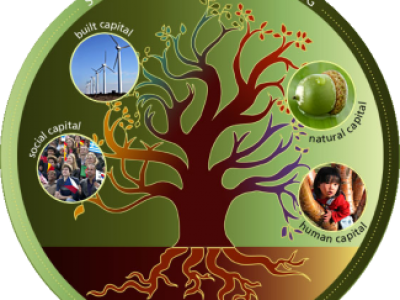New Foundation for Ecological Economics

New foundations for ecological economics by Clive Slash argues for: "Ecological economics as a radical movement is required today, more than ever, in order to criticise and change the social organisations and institutions that spread false beliefs about economic, social and environmental reality."
Slash cooncludes his arguments with a tentaive new vision for ecological ecoonomics which includes:
-
An objective reality exists independent of humans;
-
Humans create social reality;
-
Facts about social reality are inseparable from values;
-
Biophysical and social realities are distinct but are
interconnected;
-
A hierarchical ontology is accepted in which there is an
ordered structure (e.g. biophysical, social, economic);
-
Societyandtheindividualaredistinctinthattheformercannot be reduced to the latter nor the latter merely aggregate to
create the former;
-
Complex systems and their interactions create emergent
properties and are inherently unpredictable;
-
Systems are continually subject to change and interaction.
Epistemological Claims
-
Ourscientificknowledgeisalwayssubjecttostronguncertain- ty (i.e., partial ignorance, social indeterminacy);
-
We can never prove that we have discovered the truth in our scientific understanding;
-
Understanding and interpreting reality are in part social pro- cesses in which knowledge is often contested;
-
Knowledge comes in different forms and is not the exclusive domain of the expert; indigenous and lay knowledge may challenge or complement expert knowledge;
-
Knowledge is subject to reasoned critique and empirical investigation;
-
Critique can take a variety of forms leading to the need for plural methods;
-
Advancing knowledge requires accepting and rejecting infor- mation and being open to revising beliefs.
-
Splash, C.L. (2012). New foundations for ecological economics. Ecological Economics, 77, pp. 36–47.
Relevance
Ecological economics has been repeatedly described as transdiciplinary and open to including everything from positivism to relativism. I argue for a revision and rejection of this position in favour of realism and reasoned critique. Looking into the ontological presuppositions and considering an epistemology appropriate for ecologi- cal economics to meaningfully exist requires rejecting the form of methodological pluralism which has been advocated since the start of this journal. This means being clear about the differences in our worldview (or paradigm) from others and being aware of the substantive failures of orthodox economics in addressing reality. This paper argues for a fundamental review of the basis upon which ecological economics has been founded and in so doing seeks improved clarity as to the competing and complementary epistemologies and methodologies. In part this requires establishing serious interdisciplinary research to replace superficial transdisciplinary rhetoric. The argument places the future of ecological economics firmly amongst heterodox economic schools of thought and in ideological opposition to those supporting the existing institutional structures perpetuating a false reality of the world's social, environmental and economic systems and their operation.
